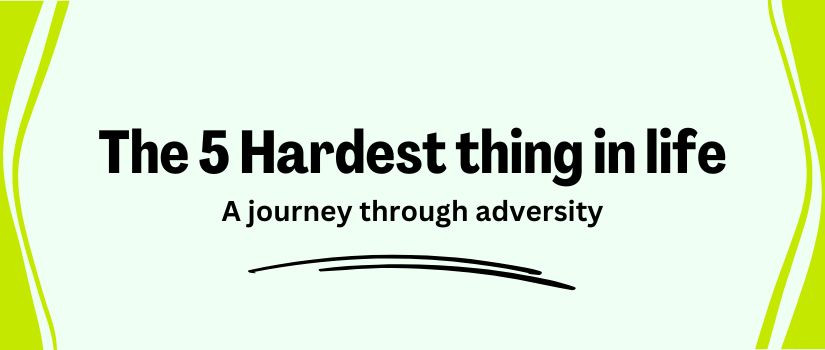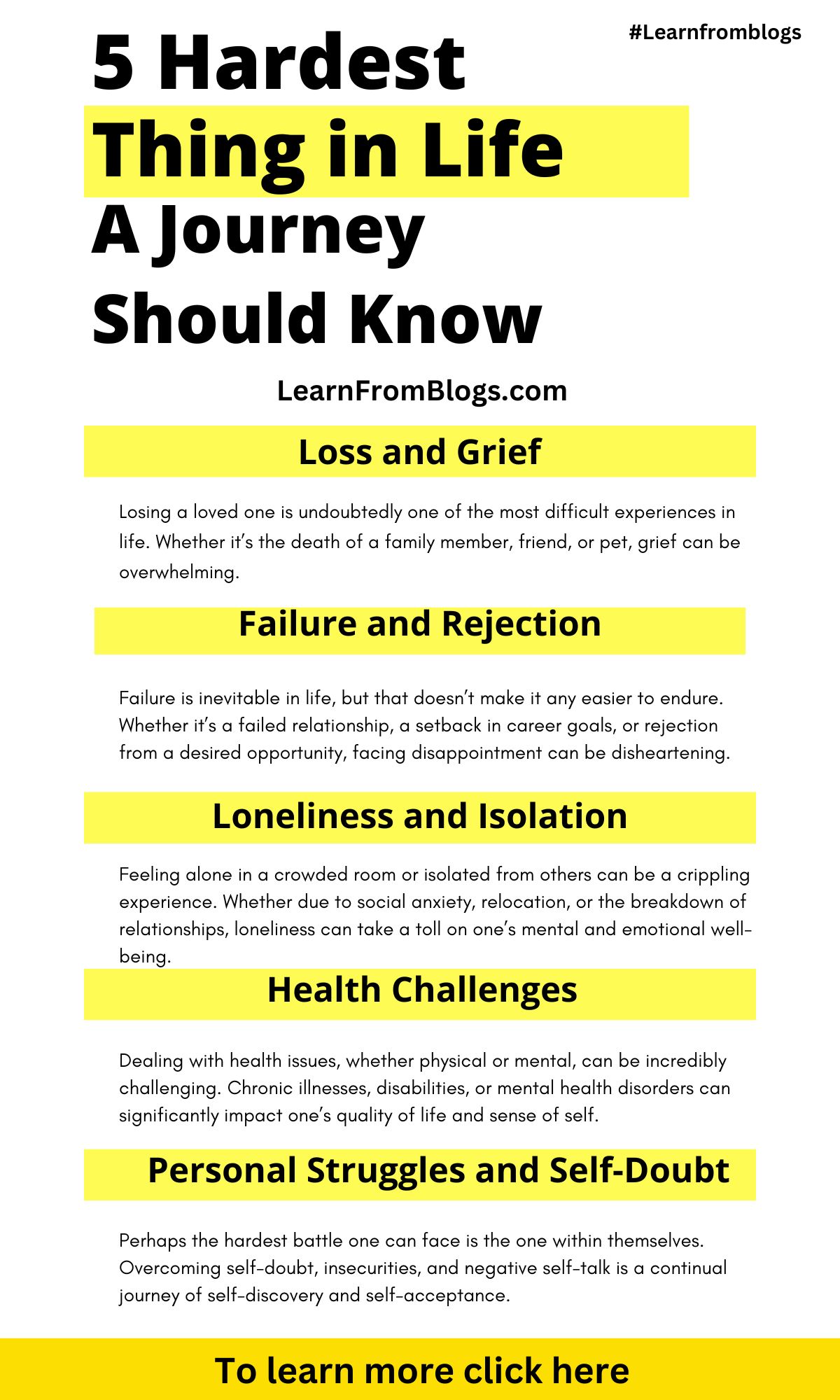
Life is a journey filled with ups and downs, triumphs, and tribulations. Here, we explore the five hardest things in life that can push us to our limits and shape who we are:
I. Loss and Grief: Losing a loved one is undoubtedly one of the most difficult experiences in life. Whether it’s the death of a family member, friend, or pet, grief can be overwhelming.
Coping with the void left by their absence and navigating the stages of grief.
II. Failure and Rejection: Failure is inevitable in life, but that doesn’t make it any easier to endure. Whether it’s a failed relationship, a setback in career goals, or rejection from a desired opportunity, facing disappointment can be disheartening.
III. Loneliness and Isolation: Feeling alone in a crowded room or isolated from others can be a crippling experience. Whether due to social anxiety, relocation, or the breakdown of relationships, loneliness can take a toll on one’s mental and emotional well-being.
IV. Health Challenges: Dealing with health issues, whether physical or mental, can be incredibly challenging. Chronic illnesses, disabilities, or mental health disorders can significantly impact one’s quality of life and sense of self.
V. Personal Struggles and Self-Doubt: Perhaps the hardest battle one can face is the one within themselves. Overcoming self-doubt, insecurities, and negative self-talk is a continual journey of self-discovery and self-acceptance.
It’s important to remember that facing adversity is a natural part of the human experience and that we are capable of overcoming even the toughest obstacles with courage, perseverance, and support from others.
In conclusion, life is not always easy, and we will undoubtedly encounter hardships along the way.
By facing adversity head-on, seeking support when needed, and cultivating resilience, we can navigate life’s toughest moments and emerge stronger, wiser, and more compassionate individuals.

Related Opinion

Life is a journey filled with twists, turns, and inevitable challenges that test our resilience and strength. From the moment we wake up to the moment we lay our heads down at night, In this blog post, we’ll explore nine common daily challenges of life and discuss strategies to overcome them.I. Time Management: With busy schedules and numerous responsibilities, managing time effectively can seem daunting. II. Stress Management: Stress is inevitable, but how we respond to it makes all the difference. III. Self-Doubt: Negative self-talk and self-doubt can hinder personal growth and success. IV. Conflict Resolution: Whether it’s with colleagues,...

Life, though beautiful and rewarding, is filled with challenges that test our resilience, determination, and character. These challenges often come unannounced, leaving us grappling for solutions and searching for meaning. In this post, we’ll explore five of the biggest challenges individuals face in their journey through life. I. Loss and Grief: Losing a loved one or experiencing a significant setback can shake the very foundation of our existence. Coping with grief is a deeply personal journey, and there’s no one-size-fits-all solution. II. Failure and Rejection: Failure and rejection are inevitable parts of life. Whether it’s a failed project, rejection from...



Ayush Bhargav
Positive Vibes Only
The exploration of life's toughest challenges in this article beautifully underscores the universal nature of these experiences and the resilience inherent in all of us. Appreciating the comprehensive overview of life’s hurdles—loss, failure, loneliness, health challenges, and personal struggles—is crucial because it helps us feel connected in our shared human experiences. It also serves as a reminder that we're not alone in our journeys, no matter how isolating they might seem.
Building on this, it's important to consider the role of societal structures and community support in mitigating these challenges. Societies that cultivate strong community support systems, prioritize mental health, and create inclusive environments for people facing health challenges tend to enhance the well-being of their citizens. This perspective emphasizes the need for policy changes and societal shifts to provide better support networks and reduce the stigma associated with these adversities.
Another perspective involves looking at the transformative potential of these hardships. While challenging, each of these experiences can also be a powerful catalyst for personal growth and transformation. Engaging with these difficulties can lead to a deeper understanding of oneself and a more profound sense of purpose in life. For instance, overcoming personal struggles and self-doubt can unlock a level of empathy and compassion that enriches one’s relationships and contributions to society.
Furthermore, the role of education in preparing individuals to cope with these life challenges should be emphasized more. Educational systems that incorporate emotional intelligence training, resilience building, and coping mechanisms for mental health not only prepare individuals for professional success but also for personal trials. This holistic approach to education can significantly impact how effectively individuals navigate life's ups and downs.
Embracing technology and digital tools can provide additional support and resources for those facing these challenges. From apps that help manage mental health and wellness to online communities that offer support and understanding, technology can bridge gaps in traditional support systems and provide new avenues for coping and healing.
Expanding our approach to include societal, educational, and technological perspectives can offer more comprehensive solutions to these age-old human experiences.
These points not only add depth to the understanding of life’s challenges but also highlight actionable ways societies can evolve to support individuals in more meaningful ways.